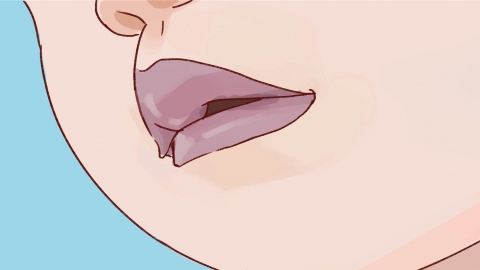Why do lips turn purple after drinking alcohol, and what should be done?
Generally, purple lips after drinking alcohol may be caused by low-temperature stimulation, alcohol allergy, anemia, bronchitis, chronic pharyngitis, or other reasons. It is recommended to seek medical attention promptly and adopt general treatments, medication therapy, and other methods under a doctor's guidance. A detailed explanation is as follows:

1. Low-Temperature Stimulation
When alcohol enters the body, it causes blood vessels to dilate and accelerates blood circulation. In cold environments, the body constricts peripheral blood vessels to maintain core body temperature. The blood vessels in the lips also constrict, slowing local blood circulation and relatively reducing the oxygen content in the blood, which may cause the lips to turn purple. Avoid cold environments while drinking alcohol, keep warm, dress appropriately, and avoid direct exposure to cold winds.
2. Alcohol Allergy
Some people are allergic to certain components in alcohol. After drinking, their bodies may experience allergic reactions that increase vascular permeability, allowing substances in the blood to leak into tissue spaces and affect local blood circulation. Blood supply and oxygenation in the lip area may be affected, causing the lips to turn purple. If alcohol allergy is known, alcohol consumption should be strictly avoided. If unsure about an allergy, try a small amount of alcohol first and observe the reaction.
3. Anemia
Anemia may be caused by insufficient iron intake, poor absorption, or chronic blood loss. When anemic, the number of red blood cells and hemoglobin in the blood decreases, reducing the capacity to transport oxygen. Areas such as the lips may not receive sufficient oxygen, leading to purple discoloration, which may worsen after drinking alcohol. Symptoms such as pale complexion and dizziness may also occur. Under a doctor's guidance, medications such as ferrous sulfate tablets, ferrous fumarate granules, and vitamin C tablets can be used for treatment.
4. Bronchitis
Bronchitis is usually caused by viral or bacterial infections. Drinking alcohol may exacerbate inflammation, causing congestion, edema of the bronchial mucosa, and increased secretions, which impair gas exchange and lower oxygen levels in the blood, resulting in purple lips. Symptoms such as coughing and sputum production may also occur. Patients can take medications such as amoxicillin granules, cefaclor dry suspension, and azithromycin dry suspension under a doctor's advice to alleviate symptoms.
5. Chronic Pharyngitis
Chronic pharyngitis is often caused by long-term irritation from smoking, alcohol consumption, air pollution, and other factors affecting the pharyngeal mucosa. Inflammatory stimulation may cause congestion and edema of the pharyngeal and surrounding tissues, affecting local blood circulation, sometimes extending to the lips and causing them to turn purple. Symptoms such as dryness and itching in the throat may also occur. Patients can use medications such as compound borax mouthwash, pharyngitis tablets, and throat-clearing granules as directed by a physician.
Pay attention to changes in your body. If abnormal conditions such as purple lips occur, even without alcohol consumption, timely medical examination is necessary to detect and address potential health issues early.







